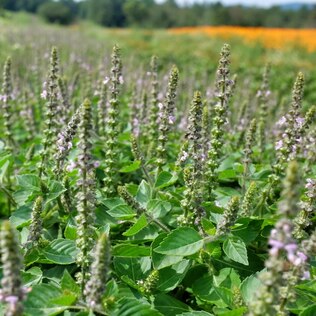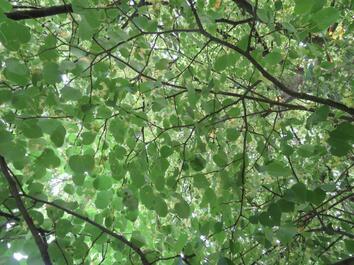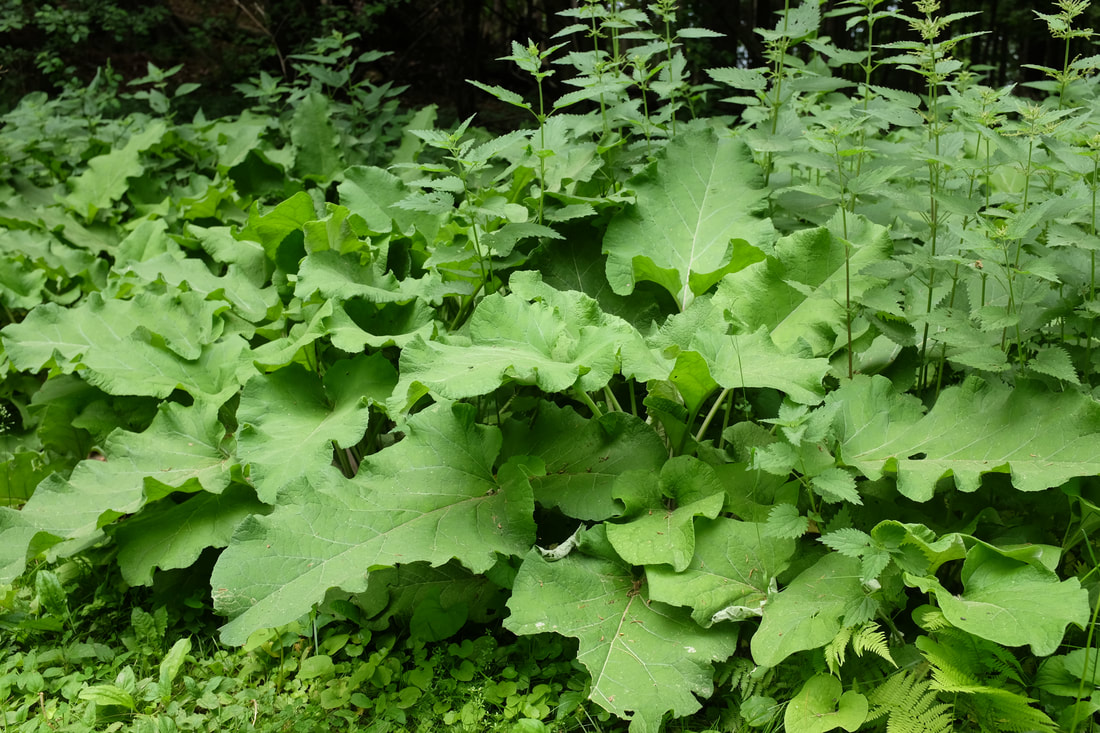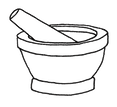 Tulsi at Foster Farm Botanicals, VT Tulsi at Foster Farm Botanicals, VT A nervine is a term used to describe a broad category of plant actions that have an effect on the nervous system. Nervines help to restore, balance, and bring ease to our nervous system. Depending on the individual, nervines may be used to calm and focus, uplift and move, relax and unwind, or bring ease to the mind and heart. Subcategories of nervines There are three major subcategories of nervines: nervine tonics, relaxing nervines, and stimulating nervines. As with any category of herbal actions (i.e. adaptogen, bitter, nootropic, immune stimulant, etc.) plants can be further characterized by defining their qualities such as aromatic, warming, and moistening. Although beyond the scope of this article, a sense of these characteristics is helpful to identify which herbs will be most helpful for a particular person and situation.  Linden tree Linden tree The nervous system reaches–or innervates (literally, “to supply with nerves”)-all parts of our body. When we support the nervous system with nervines we, in turn, also support other functions in the body, such as digestion, immunity, cardiovascular health, and adrenal health. This is why nervine herbs are used in far more formulas than ones primarily designed to support the mind and heart. This is a perfect example of how in herbalism, a person is viewed holistically. It is never “just the mind and heart.” The mind and emotional heart imbue and influence every part of the body. Now, let’s dive into the three major categories of nervine herbs… Nervine tonic A nervine tonic is an herb that broadly supports nervous system function and integrity. These tonic herbs strengthen and nourish the nervous system, and are helpful when a person’s nervous system has been heavily taxed. Often taken daily for extended periods, nervine tonics help to restore and replenish a healthy nervous system. Some favorite nervine tonics are skullcap, milky oats, and St. John’s wort. Nervine relaxant A nervine relaxant is an herb that helps to bring a sense of calm into a person’s perception. These herbs can be supportive any time of day, whether to soothe nerves that may upset the digestive tract, calm a scattered mind mid-day, or to ease into rest and recuperation at the end of the day. These herbs can be used in the moment to support occasional stress or anxiety. There are so many wonderful nervine relaxants to choose from, so it can be helpful to consider the energetics of the herbs when selecting which might be right for a person or situation. Some examples include:
Nervine Stimulant A nervine stimulant is an herb that brings excitement and stimulation to the nervous system. This can be especially helpful for occasional sluggishness or a tendency towards lower-than-desired-function in body or mind. Some of the best known and most widely consumed herbs in the world are nervine stimulants, such as Camellia sinensis (tea plant), Coffea species (coffee), and Theobroma cacao (chocolate). While these all contain caffeine and are quite strong stimulants, there are other herbal nervine stimulants that can promote gentle alertness, such as rhodiola, tulsi, and rosemary. Putting it together The information above is a basic guide to understand the nervine action and its nuances, but it is important not to get hung up on the categorization of the herbs. Each herb is complex- just like humans! Herbs carry a range of effects and have affinities for various body systems. Blending a nervine relaxant with a nervine stimulant or a nervine tonic often creates a balancing blend that takes into account the broadness of human experience by supporting various areas of body, emotion, and mind. To illustrate this point, let’s consider a person with significant muscular tension due to occasional stress who may feel tired or have difficulty focusing because of the energy it takes for them to continue holding tension in their body. In this case, they may benefit from a relaxing nervine that can help liberate stuck energy and improve outlook. A relaxing nervine might have the desired invigorating effect for this person, rather than a stimulating plant which could cause even more tension. Related categories Beyond these basic categories of nervine herbs, there are more specific categories of nervine herbs, such as:
Get support If you want help choosing which nervines may be most appropriate for you, reach out to one of our clinically-trained herbalists to get individualized recommendations. Originally written by Susan Staley 10/13/2020. Updated by Jennifer Porter 3/19/2024.
5 Comments
Are you looking for more energy? Perhaps you're experiencing one of the following scenarios: struggling to stay focused and reach your goals; getting sick frequently; feeling burnt out. A foundational concept that relates to all of these and more is the idea of vitality. Herbalism - an ancient approach to vitality Herbalism as both a philosophy and a system of medicine offers a multitude of ways to support vitality by supporting its foundations. I've seen for myself and clients I work with the profound differences that even small changes can make. I can't begin to count the number of times I've had a productivity slump turn around with the simple addition of skullcap or tulsi, or the ways that supporting my emotional health has opened up energy in unexpected areas of life. The journey to your best self Herbal medicine can help support you in becoming your best self. Specifically, supporting overall vitality can affect:
We'll also talk about how herbs themselves can help support men in each of the core areas. Note that in this article I'm focusing on the specific health needs of men because it's a unique group with unique tendencies, however this information may be applicable to people who identify as other genders, especially those raised as men. Let's dive in and take at look at some of the natural remedies for men's health. Vitality - the traditional understanding Historically, in the medicine lineage going back to Hippocrates in Ancient Greece (which actually went further back to Egypt and more), there was a concept called "physis." This basically referred to the body's ability to regulate itself, somewhat similar to the modern concept of "homeostasis" but with a much deeper meaning. The idea is that if we supply the body with what it needs then the body will maintain and heal itself. This concept is broader than the idea of vitality, but it is similar. The way we experience vitality in our bodies is intuitive - we all know moments where we feel full of energy, full of vitality and full of potential. We feel alive, vibrant and able to accomplish our dreams. And we also know the opposite. Vitality, physis and health generally can be affected by many things, and in the traditional Greco-Arab herbalism lineage there were six primary factors:
Get guidance on herbs and your wellness
Sign up for a free info call Climate and weather
Fresh air and sunshine The first consideration is just getting outside - fresh air and sunshine are fundament for good health and vitality. In Vermont, this can be difficult in the winter due to the cold, but it's also in some ways it's even more important because of the limited sun. What are some small ways you can try bundle up and get outside every day? Maybe it means upgrading your winter gear. Maybe it's going for a short walk around the block. Maybe it's building in time to walk or take the bus to work if possible. In any case, trying spend 15-45 min. or more outside every day or most days of the week can go a long way. Staying protected from the elements The second consideration is protecting ourselves from the elements when we are outside. Men in particular due to the way we've been socialized sometimes have the idea that we should "tough it out," i.e. go outside in the cold with a t-shirt. There might be good reasons behind this, i.e. slowly and intentionally building up cold tolerance, but in many cases inadequate weather protection can do more harm than good, make us more vulnerable to colds and respiratory illnesses, for example. So the first thing to consider is gearing up appropriately for the seasons and still venturing outdoor to enjoy the benefits of fresh air. In VT in the winter, this means investing in adequate jackets, hats, etc. as well as things like thermal underwear to make being outside less of a shock to the system. Herbal support In terms of herbs there are some simple ideas:
Digestion Herbalists often say that it's not what we eat that matters, but what we assimilate. Good digestion has traditionally been seen as a foundation of good health and vitality - and for good reason. Mindful eating Digestion can be an overlooked area. A lot of us men end up consuming all sorts of things without noticing how it lands in our body, i.e. in our digestive system. This can include even "healthy" things that are jumbled or blended together in a way that our body can't digest well, i.e. cold protein shakes with massive amounts of powders or supplements added in. So the first and most important thing for men is to be mindful in the process of eating. Take a moment to breathe, relax and even smell your food before diving in. Take small bites, chew thoroughly and savor the flavors. So much labor and energy went into our food - let's appreciate that. By simply being more mindful, our body's cues for digestion are triggered. The digestive juices start flowing and the digestive process starts kicking in. Our parasympthetic state ("rest and digest") kicks in. With the improved chewing, our digestion also has to work less hard to break down the food. The net effect is that often times things can become better assimilated and potential digestive symptoms avoided. More tips
Bitters blends: The simplest way to start supporting digestion with herbs is with digestive bitters. Bitters work by stimulating our digestive juices similar to the way that mindful eating does. By taking bitters 10-15 minutes before meals our digestion can get a kickstart and oftentimes improved assimilation is the result. Look for bitters blends like those by Urban Moonshine, or try herbs like dandelion, burdock or orange peel. Even commonly available bitter salad greens like arugula can have a similar function. Food and beverage Now that we've talked about digestion, let's talk about food. Food needs of course are going to vary widely depending upon the person. However, in simple terms, we can say that for most men, eating whole, natural foods and avoiding excessive processed foods is an important place to start. Whole food, plant based diets Men tend to struggle more with cardiovascular health as we age, which can seriously affect vitality, and for some men that might have to do with an excessive amount of animal protein, especially so if it's processed. Good alternatives are switching to grass-fed animal products or fish, and limiting meat to once a day, several times a week, or eliminating it entirely, favoring plant-based proteins instead like whole legumes, nuts and seeds instead. There is also an urge that men might have to make up for lack of things like fresh fruits and vegetables in the diet by instead trying to substitute with vitamin and mineral supplements. While this can be very helpful for hard to get nutrients like Vitamin D and magnesium, in most cases it's healthier to get our nutrition from food sources, especially plants. Controlling impulses Another struggle for men is impulsive unhealthy choices around food or alcohol. A suggested way to address this is finding adequate substitutes. Herbal support Herbs can help in the food and beverage category by providing healthy alternatives:
Movement and rest Finding a balance This is another tricky one for guys. On the one hand, we have an overall very sedentary culture and a lot of men don't move as much as should be, instead being unaware of our bodies and engrossed in the stimulation provided by screens. On the other hand, men can be prone to overwork and even over-exercise, not taking adequate time to give their bodies a chance to rest and rejuvenate. The balance lies somewhere in between - giving ourselves plenty of rest and downtime, and at the same aiming to do even just 15 minutes/day of movement, ideally outdoors. Herbal support Nervine relaxants: Herbs can help to promote rest and relaxation time in the category of herbs called "nervine relaxants." This category includes common calming herbs like lavender or chamomile, as well as herbs like lemon balm, linden and passionflower. Having a cup of one of these herbal teas in the afternoon or evening to unwind can go a long way. Anti-inflammatories: When it comes to movement, herbs can help a lot with the normal after-effects of vigorous exercise such as relieving pains or discomforts. Herbs like turmeric and ginger can help long-term (not as good for men that get easily overheated because they are warming spices), and immediately following intense activity salicylate containing herbs like meadowsweet or willow bark can help. Sleep This is another big one in our culture. Probably a majority of men do not get enough sleep, meaning a minimum of 7 hours but for some men up to 9-10 hours. There are so many reasons, such as demands related to work or household responsibilities, or health conditions that make sleeping difficult. Sleep hygiene The most important thing with sleep is to address sleep hygiene, specifically:
Herbal support Relaxing herbs: When needed, herbs can help support sleep, especially with falling asleep. Common herbs like those mentioned for relaxation can apply here, with larger-than-daytime doses 30-60 min. before bed (i.e. chamomile, lavender, lemon balm), or more potent sleep herbs like hops or valerian. Herbs can really help significantly, but remember they won't substitute for the above. Emotions In today's day and age there's not enough credit given to the effect that emotions have on health and vitality, though this connection was very obvious in traditional medicine, so much so that in a medical sense emotions were often described in terms of the physical symptoms they were often correlated with. Processing emotions It goes almost without saying that for men finding healthy ways to process or deal with emotions can be difficult. Many men are socialized to suppress emotions so that they can continue working harder and appear somehow strong or infallible. This cultural phenomenon has, in my opinion, caused a lot of harm. The first step here is simply acknowledging the emotions that we experience, and that they can be uncomfortable. The second step is finding a healthy way to express these emotions, which likely should ultimately involve sharing those emotions and getting support from other people, whether it's friends, family, support groups or a counselor or therapist. Herbal support Uplifting and relaxing herbs: Herbs can't be a substitute for doing the work in this area but they can play a supportive role. Again, the relaxing herbs show up, particularly those that also can affect the mood like lemon balm, linden or tulsi. Herbs like these can provide a gentle boost toward positivity, helping our mental chatter to subtly move in a more positive direction without shutting down the underlying emotions. Conclusion A lot of us are looking for more energy. For men, there are things related to how men are socialized that affect how we maintain our energy. Herbal medicines provides a framework based on ancient principles for supporting day-to-day vitality with healthy diet and lifestyle choices. Herbs themselves can provide support in each area. If you're looking to get started with herbs, start with something small and that you know is safe for you. If there's anything we can help with, feel free to get in touch! Written by Nick Cavanaugh. Nick is a clinical herbalist practicing at Railyard Apothecary. To book a consultation to get support with your health click here. |
Details
RAILYARDCheck in here to keep updated on news and activities at the apothecary. Archives
April 2024
Categories
All
|
railyard apothecary
*These statements have not been evaluated by the Food and Drug Administration. This product is not intended to diagnose, treat, cure, or prevent any disease. For educational purposes only.
|
|



 RSS Feed
RSS Feed
